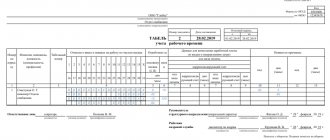The reasons for dismissal according to the Labor Code of the Russian Federation are exhaustive. This means that an employee cannot be dismissed for reasons not expressly provided for in it. At the same time, employers often violate the law and can fire an employee, including because of a trivial conflict with him. Of course, such actions by the employer are neither legal nor acceptable.
And an employee who is faced with such illegal behavior against him must make every effort to defend the rights given to him by the state. In this article we will talk about what reasons for dismissal are legal, as well as in what order dismissal should be carried out on their basis.
Termination of an employment contract at the initiative of the employee.
An employee who decides that he no longer wants to continue working in his job has the right to apply for resignation at any time without giving reasons. The only requirement for him is to comply with a two-week deadline for notifying his supervisor.
Expert advice:
Natalia
Labor expert
Make a resignation letter in writing and hand it to an authorized employee of the employer against signature. If for any reason the employer refuses to accept your application, send it by certified mail, always enclosing a form for notification of delivery of correspondence to the addressee.
Notice period for dismissal
Dependence on the reason for dismissal
The standard notice period is two weeks.
Until they expire, you will need to continue working, and only after that does it become possible to quit. However, if the application is submitted for a valid reason, you can resign immediately. And if it is not there or it is not respectful, then the scheme will be as follows:
- The employee submits a letter of resignation of his own free will.
- Works for the two weeks required by law.
- He receives the payment and leaves the workplace - he no longer bears any obligations to the employer. Note: the employer cannot force him to continue working or threaten him with anything. In particular, there are often cases of threats not to hand over the work book - this is a violation of the law and must be stopped.
List of valid reasons
What reasons are considered valid according to the Labor Code?
- The employee can no longer continue to work - this primarily means retirement. Let pensioners sometimes continue to work, and yet retirement upon reaching the appropriate age is the inalienable right of every citizen, and if this age is reached and he wants to go on a well-deserved rest, then the reason is undoubtedly considered valid. In addition to a pension, it can be other things - for example, admission to an educational institution.
- Violation of labor legislation by the employer - this may be a violation of the contract with this particular employee, a collective agreement, and so on.
- Sending a spouse to serve or work outside the country.
- The need to move arises.
- The employee has developed a disease that interferes with his current type of activity or even living in the area where the work is located.
- He takes care of a sick family member or a disabled person who prevents him from continuing to work.
- A child under fifteen years of age needs care.
To leave a job without working time, a valid reason must be confirmed by some document.
As we have already indicated, until 2002, in order to terminate a fixed-term employment contract, it was necessary to have a valid reason, and without it it could not be done. Until 2010, its presence was required to maintain continuous work experience. Now the pension legislation has changed again, and length of service has lost its previous meaning, so the validity of the reason is now important only for working off, and the employee will not lose anything by resigning without any indication at all - he will simply need to work for two weeks. And if you manage to come to an agreement with the employer, you may not even have to.
Valid reasons for voluntary dismissal have been discussed; now it is worth paying attention to disrespectful ones - mainly those that are sometimes mistaken for valid ones. These include:
- Admission to part-time study – please note that valid reasons for dismissal include only admission to full-time study.
- Reluctance to work a two-week deadline.
- Lack of mutual understanding with management.
- Illness not confirmed by a medical certificate.
- Caring for an adult child without deviations in health.
Citing any such reason does not give you the right to do without work if the employer requires it, and if you do not want to complicate your search for the next job, you should still spend two more weeks at the workplace.
Another important point related to the reasons for dismissal is their presentation in the resume. Since the resume is important for finding the next job, some reason is usually indicated that is not related to possible conflicts, complaints from superiors, and the like. If certain complaints about the job are indicated, they should be of a practical nature, for example, dissatisfaction with the level of pay or lack of further prospects for career growth.
Dismissal at the initiative of the employer.
The dismissal of an employee at the request of the employer is completely different. First, there must be a reason for it. Secondly, such a reason must be indicated in the Labor Code of the Russian Federation as a basis for dismissing an employee. And thirdly, the reason for dismissal must be confirmed by the employer with relevant documents, including acts, memos, explanatory notes, etc.
An employer may demand the dismissal of an employee on one of the following grounds:
- Staff reduction;
- Termination of activities (liquidation);
- Gross failure by the employee to fulfill his obligations, including absenteeism;
- Other grounds expressly provided for by law.
Registration of an explanatory note
Not every employee knows how to correctly draw up an explanatory note and how to indicate in it the reason for absence from work. It is the correctly formulated reason that is the legal basis for your absence and will protect you from unlawful dismissal.
A written explanation for failure to appear is a document drawn up by the truant in his own hand in any form, but maintaining a business style.
Document writing scheme:
- In the upper part, in the right corner, write the full or abbreviated name of the organization, the full name of the manager, to whom the employee addresses with explanations.
- The title of the document is indicated in the center of the sheet. In many organizations, this is an explanatory note about absence from work.
- Below is a description of the circumstances of absence from work, which is presented arbitrarily.
- Below is the autograph of the truant and the date of compilation.
- It is necessary to list the documents confirming the fact of absence, if any, and attach them to the note.
All attributes of the note must be written correctly, without distorting the facts. There must be a business style of writing. All facts and reasons are presented directly, without emotional cues.
There are moments that have a dual nature and can be regarded by the employee on the one hand, and by the employer on the other. For example, if an employee was absent from the workplace for more than 4 hours, but was present in another workshop of the enterprise, this is not absenteeism. If the time away from production was exactly 4 hours and not a minute more, this is not absenteeism. If, for some reason, an employee was unable to notify the boss of a valid reason, but there is documentary evidence of this, this is not absenteeism.
The occurrence of such moments should be fully reflected in the note. After drawing up the explanatory note, it must be endorsed in the incoming correspondence journal by the secretary and submitted to the manager for signing.
The deadline for drawing up the document has been established, which is two days from the moment of absenteeism.
Dismissal without good reason under the Labor Code of the Russian Federation.
Unreasonable or illegal dismissal of an employee at the request of the employer is unacceptable. And if it takes place, the employee can appeal it to the labor inspectorate or the prosecutor's office. As a result of this, the employer faces an unscheduled inspection, an order to eliminate violations, and administrative liability.
Unlawful dismissal can also be appealed in court. A dismissed employee has the right to demand reinstatement at work, payment of wages for the entire period of forced absence from work, as well as compensation for moral damage.
It might be interesting!
What grounds can there be for officially dismissing an employee?
Erroneous actions of the employer upon dismissal
A typical employer mistake is dismissing an employee for insufficient reasons. For example, someone who was 10 minutes late was fired for absenteeism. Or, for violating labor discipline, the employee was fired without an act indicating the violation.
The actions of the employer in this case will not be legal. To dismiss for disciplinary offenses, it is necessary to prepare the appropriate evidence base. This will be sufficient grounds for dismissal. For your information, this provision applies to dismissal for the employee’s guilty actions, untimely completion of work, inadequacy of the position, etc.
On the issue of dismissal without good reason before the expiration of the employment agreement or training contract
We are talking about the application of the provisions of Art. 249 Labor Code of the Russian Federation. This article requires the return of funds paid by the employer for training an employee if the student quit without good reason.
As such, there is no legal act that defines valid reasons. For this reason, Rostrud, within the powers of the information portal “Online Inspectorate.RF”, provides the following explanations to the interested user. Information is current as of January 2021.
Details. In the situation under consideration, the employer, together with the student, has the right to independently determine which reasons in this particular case will be valid for early dismissal .
Any disagreements that arise between the parties will be classified as an individual labor dispute (Article 381 of the Labor Code of the Russian Federation). The consideration of such disputes is the responsibility of labor dispute commissions and courts. Accordingly, to resolve a dispute, the resigning employee can appeal to the commission or court.
Dismissal during probationary period.
When hiring a new employee, the employer has the right to set a probationary period in order to check his business qualities. The employee also benefits from establishing a trial period, because during this period he can get to know the employer from the inside and understand whether this job is suitable for him.
In general, testing work is almost no different from regular work. Almost all the rights and obligations of the parties to an employment contract are the same. The only difference is the timing and order of dismissal.
An employee who wishes to terminate his employment relationship with the employer during the probationary period must notify him of this in just 3 days, after which he must be dismissed. The same notice period is established for the employer. However, the employer is obliged to substantiate and support his point of view with the evidence available to him. The grounds for dismissal must comply with the Labor Code of the Russian Federation.
Legal regulation of dismissal for absenteeism
As practice shows, termination of employment relations due to absenteeism is an extreme measure that employers rarely resort to. Previously, other measures of responsibility are applied to the violator of the rules (reprimand, reduction of bonus, warning). But with systematic absenteeism, dismissal under the article is inevitable.
The legality of dismissal is indicated in Article 81 of the Labor Code of the Russian Federation. A violation is usually understood as the temporary absence of a person from the place of work without good reason for one shift (without taking into account its duration) or for 4 hours of one workday.
Conditions for holding an employee accountable:
| Components of an offense | Details |
| Confirmation of absence | The legislation establishes that a person’s failure to appear at the workplace constitutes a violation. Article 209 of the Labor Code states that the definition of a workplace is indicated in the provisions of local regulations, therefore the person’s job description must be followed. Hence absenteeism is the absence of a citizen at an enterprise where he must perform functional duties. |
| Time away | It is not allowed to dismiss an employee if he was absent from the enterprise for less than four hours or exactly 4 hours. But this does not prohibit other options for disciplinary action from being applied to him. |
| Rules for recording absenteeism | Even episodic absences will be considered a violation of discipline: for example, when an employee evaded performing his functional duties for several hours during one working day, which in total amounted to at least 4 hours and 5 minutes. |
| Valid reasons that exclude punishment for absenteeism |
|
In addition, according to the provisions of the Plenum of the Supreme Court of the Russian Federation No. 2 of 2004, the head of an organization has the right to formalize the forced dismissal of an employee when going on regular leave without the director signing a corresponding order or without a resolution from the boss. Such actions will be considered truancy.
IMPORTANT! Dismissal of employees for absenteeism is possible no later than a month after the commission of the offense. If management became aware of the absenteeism later, the dismissal of the employee would be illegal.
Dismissal due to death of the Labor Code of the Russian Federation.
Natalia
Labor expert
One of the grounds for terminating an employment relationship with an employee is his death. The employer issues an order to terminate the employment relationship with a deceased employee on the basis of a death certificate. The day of termination of the employment relationship is the day of the employee’s death.
The employer is also obliged to enter information into the work book of the deceased employee about the termination of the contract with him in connection with death, and give it to one of the employee’s relatives, or, upon his written application, send it by mail.
Attention! It is prohibited by law to send work books outside the Russian Federation. Therefore, if a relative of the deceased asks to send his work book abroad, the employer should send him a letter containing information about this provision of the law, as well as with a request to appear for the work book in person, or indicate a sending address located within Russia.
Unexcusable reasons for dismissal
The list of reasons considered disrespectful may vary. The most common include:
- the need to care for a child over 18 years of age;
- poor relationships with the team or management;
- the employee's desire to retire early.
An employee’s lack of awareness of what reasons may be valid for dismissal from a position may result in giving a reason for refusal to work, which is disrespectful under current labor legislation.
How to properly dismiss an employee for health reasons under the Labor Code of the Russian Federation.
If the employee’s health condition has deteriorated and does not allow him to continue to perform his job function, the employer is obliged to offer him another job that he will be able to perform. But if he does not have such work, or the employee himself expresses his refusal to transfer, the employer will have to terminate the employment relationship with him. The dismissal of such an employee must be properly formalized.
So, if an employee refuses another position offered to him, his refusal must be made in writing. And if the employer does not have such a position, then he must draw up a corresponding written notification. After this, the employer must draw up a dismissal order for medical reasons.
The wording of the entry in the work book will also differ depending on what exactly caused the dismissal - the employee’s refusal to transfer, or the employer’s lack of suitable work.
It might be interesting!
What to do if your employer fires you without warning
On the last day of work, such an employee must be given a paycheck, which must include:
- Remaining salary;
- Compensation for unused vacation days;
- Severance pay in the amount of two weeks' average earnings.
What legal reasons does an employer have for dismissal?
Any dismissal must be justified by law, and all reasons for dismissal that seem at least unreasonable or frankly fictitious or at least suspicious to you must be checked for legality. Below I will list all the legal reasons for terminating an employment contract with an employee:
- The employer has the right to dismiss an employee, that is, to terminate the contract with him in the event of liquidation of the organization or if you worked for an individual entrepreneur and he ceases its activities; in simple words, you have the right to dismiss you if the organization ceases its activities;
- If you are among the staff that will be laid off. But know that if the number of employees is reduced, you must be notified 2 months before the start of the reduction;
- If, according to the results of the certification, the employee does not correspond to the position held due to insufficient qualifications, please note that this fact must be confirmed by the results of the certification;
- The manager or chief accountant may be dismissed if the owner of the organization’s property changes;
- An employer has the right to terminate an employment contract with an employee if the employee repeatedly fails to fulfill the work duties assigned to him without good reason. In this case, a violation is understood as repeated violation of labor legislation, violation of obligations under an employment contract, violation of internal labor regulations in the workplace, violation of job descriptions, regulations, instructions, orders of the employer, technical rules. Or if the employee already has a warning or reprimand documented and he again neglects to fulfill his job duties, then this also threatens with dismissal;
- The employer has the right to dismiss if the employee has grossly violated his work duties one time: a) the employee skipped work, that is, was absent from his workplace throughout the entire working day, as well as if the employee was absent from the workplace for 4 hours in a row during the working day b) If the employee came to work in a state of alcohol or drug intoxication or appeared in such a state on the employer’s premises. The state of alcohol or drug intoxication must be officially recorded, an examination must be carried out c) a gross violation is also the disclosure of a secret protected by law that became known to the employee in the process of performing work duties, and also the disclosure of personal data of another employee is equivalent to a violation of a similar nature. ) a gross violation is considered to be the commission of theft, including petty theft of someone else’s property, damage or destruction of such property e) a gross violation is considered to be a violation by an employee of labor protection requirements if the violation resulted in an accident, accident, catastrophe, and there is a cause-and-effect relationship between the violation and the consequences must be established by the labor protection commission, and also the actions of an employee that create a threat of an accident, catastrophe, or industrial accident are equated to a violation of this kind;
- The reason for dismissal at the initiative of the employer may be the actions of an employee servicing monetary or commodity assets, which served as a reason for the loss of confidence in this employee on the part of the employer. In order to lose the trust of the employer, the employee must make a mistake due to which the employer cannot further trust the employee with this work; in such a situation, the employee must be irresponsible or negligent in his duties, which caused the loss of money or valuables;
- If an employee performing educational work in an organization has committed an immoral act, which in its significance is incompatible with further work in this position;
- As for the management team, the employer can dismiss a managerial employee after the manager makes an incorrect decision, which entails a violation of the safety of property, its illegal use or the decision caused damage to the organization, this also applies to the chief accountant. Also, the reason for the dismissal of a manager may be a one-time gross violation of labor duties;
- The reason for dismissal may be the provision by the employee of forged (forged) documents to the employer when concluding an employment contract;
As you can see, there must be well-founded reasons for dismissal, and the employer does not have the right to fire you just like that.
If you are fired due to staff reduction, or if you are not suitable for the position you occupy, as confirmed by the results of the certification (clauses 2 and 3 of Article 81 of the Labor Code of the Russian Federation), then the employer must first transfer you, with your written consent, to another position, including again an open vacancy that corresponds to your qualifications, for another vacant lower position or for a position with a lower salary, and if the employee refuses the offer and does not give written consent, then only after this the employment contract is terminated. Also, upon dismissal under paragraphs 2 and 3 of Article 81 of the Labor Code of the Russian Federation (redundancy, lack of qualifications), the employer is obliged to offer the employee all available vacant positions in the given area.
Also know that the employer does not have the right to fire an employee on his own initiative if the employee is on sick leave or on vacation, but there is one exception; the employer can fire you even if you are on sick leave or on vacation if the organization is being liquidated or if you are an individual entrepreneur you are working stops working.
How to dismiss an external part-time worker at the initiative of the employer, Article 288 of the Labor Code of the Russian Federation?
Employment relations with a part-time worker are terminated on the same basis as with main employees. At the same time, Art. 288 of the Labor Code of the Russian Federation establishes one additional basis for their dismissal at the request of the employer. This applies only to those part-time workers who perform their labor function under an open-ended contract.
The employer has the right to terminate the employment relationship with them if they hire an employee for whom it will be the main one. The employer is obliged to notify the part-time employee of his decision in writing. Such notice must be given to him no less than 14 days before the date of his dismissal.
Procedure for calculating an employee who has disappeared and does not appear
Let's consider the procedure for how to proceed and how to correctly formalize the dismissal of an employee for absenteeism who does not go to work for a long time. If an employee has disappeared and does not appear at work for a long time, and all ways to contact him have been exhausted (does not answer calls, does not show up at his place of registration, neighbors do not have any information), then the situation becomes somewhat more complicated, but this does not give the employer the right to violate the dismissal procedure , and he is obliged to demand an explanation for the employee’s absence.
In this case , it is worth sending a request for explanations to the employee’s place of registration , and the postal item should be sent by registered mail with acknowledgment of receipt. This is the only way in the future the employer will be able to confirm compliance with the requirements of Art. 193 Labor Code of the Russian Federation.
Further, from the moment such correspondence is delivered to the employee’s address, you should wait two working days. If, after their expiration, the employee still does not provide an explanation, the employer must draw up an appropriate act about this, after which an order is issued.
It is worth noting that according to Article 84.1 of the Labor Code of the Russian Federation, if it is impossible to bring the specified order to the attention of the employee, then a corresponding entry must be made in the order itself.
Before drawing up the order, it is advisable to try to contact the employee to find out the reasons for his absence from the workplace, because it is not at all necessary that the person did not come to work solely due to his own negligence. In particular, the reasons for absence may be :
- illness of the employee or his children;
- fulfillment of civil or public obligations;
- performing donor functions or undergoing a medical examination for these purposes;
- detention (for example, arrest);
- passing a medical examination for entry into military service;
- emergency situations resulting in the impossibility of arriving at work at the appointed time (for example, work carried out by emergency services that require immediate access to the employee’s home), etc.
In all of the above circumstances, there is no need to rush to formalize dismissal for absenteeism, since the courts, when assessing the validity of an employee’s absence from the workplace, often side with the worker, as the more vulnerable party in the labor relationship.
If the disappearance of an employee raises suspicions that a crime has been committed (kidnapping, murder), then the employer can show his civic position and contact law enforcement agencies. The Labor Code, however, does not oblige you to do this.
So what date of dismissal should be put in personnel documents if the employee never showed up for work? According to Art. 84.1 of the Labor Code of the Russian Federation, the day of contract termination is the last day of work of the employee, i.e. the day preceding absenteeism, which means it should appear in personnel documents as the date of dismissal.
Moreover, Article 84.1 of the Labor Code of the Russian Federation exempts the employer from liability if the work book is not issued on the day of registration of dismissal for absenteeism, and therefore allows for a situation where termination of the employment contract occurs retroactively (about what date to dismiss the violator for absenteeism and in what time frame you need to do this, read here).
In the video below we will find out what to do if an employee disappears and does not appear, and what the employer should do in this case:
Reasons that are not valid
The validity of the grounds for leaving is not always respected by the employee, due to his ignorance of the law. For example, a newly minted student can be dismissed at his own request and considered valid grounds only if the person was enrolled not in a full-time department of an educational institution, but in a part-time department. That is, he may well continue to perform his work functions, since he is not required to attend school every day.
Dismissal for absenteeism: step-by-step instructions
We found out how dismissal for absenteeism should be carried out (step-by-step procedure-scheme). It summarized all definitions and conclusions from judicial practice.
Step 1. Record the fact of absenteeism from work
After 4 hours of absence, a report must be drawn up. The document is drawn up in free form according to the internal rules of the company, always with two witnesses. If the employee does not come, a second report should be drawn up - for the remaining 4 hours of the working day.
For the next three days of absence, you can draw up one such document daily. Then - one act weekly. When the employee appears, he must be familiarized with these documents against signature and asked for an explanation for the absence. Such a request can be sent by mail.
Step 2. Note the absence on the report card
In the procedure for dismissal under an article for absenteeism, the preparation of a report card plays an important role. Until all the circumstances are clarified, it is impossible to label an employee as a truant.
The day of non-appearance confirmed by the act is indicated by the code “NN” - for unknown reasons. If, after receiving written explanations from the employee, management considers the reasons for the absence to be disrespectful, it can be corrected to “PR”. This can also be done if there is an act of refusal to give explanations. But if there are no accompanying documents, and the code is “PR”, the State Tax Inspectorate and the court may declare the dismissal illegal.
Useful information about working time tracking is in our video.
Step 3. Inform your superiors
Immediately after drawing up the first report of absence from work, you should write a memo addressed to the manager. It briefly describes the situation and outlines a schematic sequence of actions: obtain explanations and, if necessary, bring them to administrative responsibility up to termination of the employment contract.
Step 4. Get an explanation
The simplest development of events is when the employee eventually went to work and wrote an explanatory note. Based on it, management will decide whether the reasons were valid or whether to still admit the violation.
If the person does not appear, the scheme becomes more complicated. Questions about the reason for no-show must be sent by mail. To do this, you need to issue a registered letter with an inventory of the contents. It should be written on company letterhead and signed by the head of the company. The application must specify the deadline for providing explanations. It shouldn't be too short. Usually they give 15 days.
If at the end of the established period no explanations are received (or the letter is returned), it is necessary to draw up an act of the employee’s refusal to explain his absence. This document is important, especially if the case goes to court.
If explanations are received, management evaluates the extent to which the reasons are valid. If the explanations are found to be unfounded, you must continue to follow the step-by-step instructions for dismissing an employee for absenteeism.
Step 5. Prepare a document for bringing to administrative liability
The justification can be issued as a memo or a conclusion based on the results of the proceedings. The document follows:
- Briefly describe the situation.
- Indicate the reasons given by the employee himself.
- Give a conclusion on recognizing these reasons as disrespectful.
- Propose a measure of administrative punishment.
The justification should be sent to the manager for review. He can agree with the proposal or refuse. Resolution options: “I agree, apply dismissal as a sanction,” “replace dismissal with a reprimand.”
Step 6. Issue an order
To draw up an order, you can use the unified form T-8.
The violator must be familiarized with the document against signature within three days from the date of publication. If the employee “refuses” and does not agree to leave a signature, a separate act must be drawn up about this. Again with two witnesses.
Step 7. We draw up a work book
In column 3, after the words about termination of the employment contract for a gross disciplinary violation, be sure to indicate the article under which the dismissal occurs. Entry format: “subparagraph “a” of paragraph 2 of part 1 of article 81 of the Labor Code of the Russian Federation.” In column 4 write the number and date of the order.
Step 8. Calculate
According to the Labor Code, on the last day of work, the employee must receive a full payment and his work book. Truants are no exception. Does the employee disagree with the decision and not take the work? Happens. Invite two witnesses, draw up a report.
It’s more difficult when the person doesn’t show up at all. Send a letter notifying that you need to come pick up the work document or agree to have it sent by post.
If none of the options work, the book remains in storage in the company’s archives. For 75 years.









